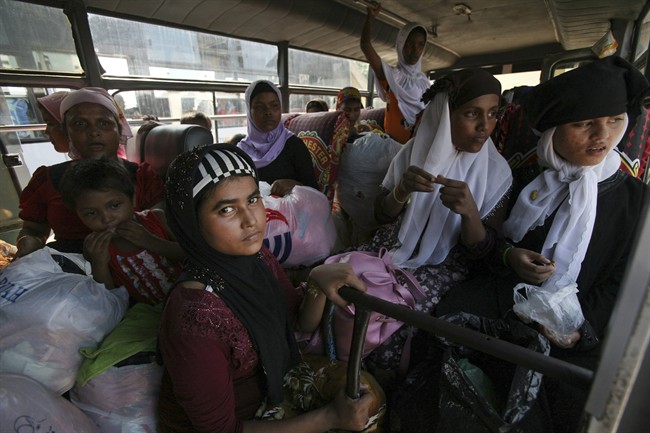JAKARTA, Indonesia – More than 1,000 migrants came ashore in different parts of Indonesia and Thailand on Friday, becoming the latest refugees to slip into Southeast Asian countries that have made it clear the boat people are not welcome.

Weak, hungry and dehydrated, most of the migrants were crammed onto three boats that Indonesian fisherman towed ashore in Aceh province and North Sumatra, while another 106 people were found on a Thai island Thursday and brought to the mainland Friday, authorities said.
Earlier this week, about 1,600 migrants were rescued by the Malaysian and Indonesian navies, but both countries then said they could not accept any more and sent other boats away in what has become a regional humanitarian crisis – that no one in the region is rushing to solve. It wasn’t clear whether those who came ashore Friday had been turned away earlier.
U.N. Secretary-General Ban Ki-moon said he was “alarmed by reports that some countries may be refusing entry to boats carrying refugees and migrants,” according to a statement from his office Thursday. Ban urged governments in the region to “facilitate timely disembarkation and keep their borders and ports open in order to help the vulnerable people who are in need.”
Southeast Asia for years tried to quietly ignore the plight of Myanmar’s 1.3 million Rohingya but is now being confronted with a dilemma that in many ways it helped create. In the last three years, more than 120,000 members of the Muslim minority, who are intensely persecuted in Buddhist-majority Myanmar, have boarded ships to flee to other countries, paying huge sums to human traffickers.
But faced with a regional crackdown, some captains and smugglers have abandoned the ships, leaving many migrants to fend for themselves, according to aid workers and human rights groups. The boats are also filled with Bangladeshis fleeing poverty and seeking better jobs.
Most of the migrants are believed to be heading to Malaysia, a Muslim country that has hosted more than 45,000 Rohingya over the years but now says it can’t accept any more. Indonesia and Thailand have voiced similar stances, and Thailand is convening a regional conference to discuss the problem later this month.
As boatloads of migrants popped up in scattered spots of Southeast Asia’s shorelines Friday it was increasingly clear that nobody knows how many boats are adrift at sea or where they are located.
One of the boats in Indonesia’s eastern Aceh province was packed with 790 people, including 61 children and 61 women, many in weak condition from lack of food and water, said Lt. Col Sunarya, who like many Indonesians uses only one name. Fisherman spotted their vessel on the verge of sinking and towed the boat to the coastal village of Langsa.
“Some of the people told police they were abandoned at sea for days and Malaysian authorities had already turned their boat away,” said Sunarya, a Langsa police chief who said the migrants came from Myanmar and Bangladesh.
About 25 kilometres (15 miles) south of Langsa, fishermen rescued the smaller boat carrying 47 Rohingya, also dehydrated and hungry, said police chief Dicky Sandoni, from Aceh’s Tamiang district.
In neighbouring North Sumatra province, fishermen rescued a third boat with 96 people on board, adrift at sea in a motorless boat and weak from hunger, said Capt. Suroso of the Langkat district police. They were provided basic shelter and food, he said.
Separately, the Thai navy found 106 people, mostly men but including 15 women and two children, on a small island Thursday off the coast of Phang Nga province, an area known as the Surin Islands and famous for its world-class scuba diving.
“It’s not clear how they ended up on the island,” said Prayoon Rattanasenee, the Phang Nga provincial governor. The group said they were Rohingya migrants from Myanmar. “We are in the process of identifying if they were victims of human trafficking.” They were brought to the mainland Friday and were being held at a police immigration facility.
Denied citizenship by national law, Myanmar’s Rohingya are effectively stateless. They have limited access to education or adequate health care and cannot move around freely. They have been attacked by the military and chased from their homes and land by extremist Buddhist mobs in a country that regards them as illegal settlers.
Despite appeals by the U.N. and aid groups, no government in the region – Thai, Indonesian or Malaysian – appears willing to take the refugees, fearing that accepting a few would result in an unstoppable flow of poor, uneducated migrants.
Earlier this week, both the Malaysian and Indonesian navies sent away boats carrying hundreds of people, marking a reversal after letting in a few boats just days earlier.
“What do you expect us to do?” asked Malaysian Deputy Home Minister Wan Junaidi Jafaar on Thursday. “We have been very nice to the people who broke into our border. We have treated them humanely, but they cannot be flooding our shores like this.”
“We have to send the right message,” he said, “that they are not welcome here.”
Malaysia is host to more than 150,000 refugees and asylum seekers, the majority who are from Myanmar. More than 45,000 of them are Rohingyas, according to the U.N. refugee agency.
Thai Prime Minister Gen. Prayuth Chan-ocha also said his country couldn’t afford to host the refugees.
“If we take them all in, then anyone who wants to come will come freely,” he said. “Where will the budget come from?”
He had no suggestions as to where they should go, saying: “No one wants them.”
—
Associated Press writer Jocelyn Gecker in Bangkok contributed to this story.



Comments